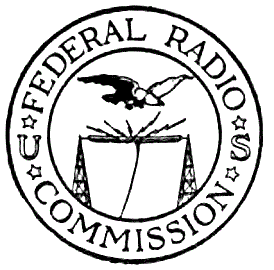
Federal Radio Commission
The Federal Radio Commission (FRC) was a government agency that regulated United States radio communication from its creation in 1927 until 1934, when it was succeeded by the Federal Communications Commission (FCC). The FRC was established by the Radio Act of 1927,[1] which replaced the Radio Act of 1912 after the earlier law was found to lack sufficient oversight provisions, especially for regulating broadcasting stations. In addition to increased regulatory powers, the FRC introduced the standard that, in order to receive a license, a radio station had to be shown to be "in the public interest, convenience, or necessity".
Agency overview
Federal Radio Commission[edit]
Radio Act of 1927[edit]
Prior to the early 1926 adverse ruling on the Commerce Department's regulatory authority, there had been numerous efforts in the U.S. Congress to replace the Radio Act of 1912 with a more comprehensive bill, but none of these efforts made much headway. The need for new legislation gained additional importance because, in the absence of federal regulation, stations were taking their individual disputes to the courts, which began to render decisions favoring incumbent stations. This effectively was granting established stations "property rights" in the use of their assignments, which the government wanted to avoid, because it generally considered the radio spectrum to be a public resource.
Despite the recognition that new legislation was needed, there was a lack of consensus whether it should increase the authority of the Secretary of Commerce, which opponents argued would create a too-powerful "Radio Czar", or if an independent regulatory body was needed, which some disputed was unneeded and overly expansive. The legislation ultimately passed was known as the Dill-White Bill, which was proposed and sponsored by Senator Clarence Dill (D-Washington) and Representative Wallace H. White Jr. (R-Maine) on December 21, 1926. It was brought to the Senate floor on January 28, 1927, and, as a compromise, specified that a five member commission would be given the power to reorganize radio regulation, but most of its duties would end after one year. After a month of debates this bill was passed on February 18, 1927, as the Radio Act of 1927,[9] and signed into law by President Calvin Coolidge on February 23, 1927.[10] The Commission's organizational meeting was held on March 15.
Replacement by the Federal Communications Commission[edit]
The Communications Act of 1934 abolished the Federal Radio Commission and transferred jurisdiction over radio licensing to the new Federal Communications Commission (FCC). Title III of the Communications Act contained provisions very similar to the Radio Act of 1927, and the FCC largely took over the operations and precedents of the FRC. The law also transferred jurisdiction over communications common carriers, such as telephone and telegraph companies, from the Interstate Commerce Commission to the FCC.